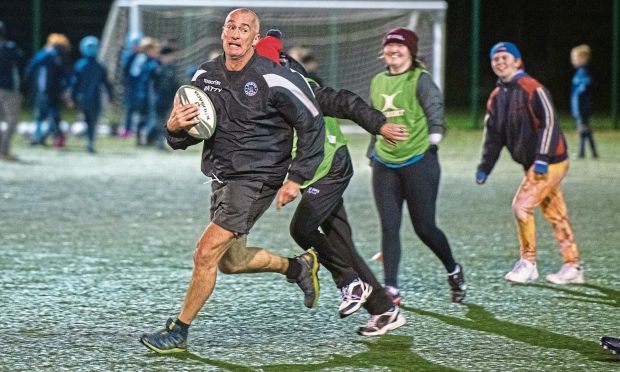Scotland are out of the Rugby World Cup and Japan deservedly through the quarter-finals after the host nation’s dynamic and entertaining game won the last and maybe best of the pool games in this competition.
After all the machinations of the last week when it seemed the Scots would be going home without completing their pool schedule, the game was played In Yokohama a day after a typhoon blew through the city and it was a cracker.
No one could doubt the Japanese, who opened out and played some of the best attacking rugby seen at this World Cup, deserved their 28-21 victory, but Scotland survived a potential humiliation and seemed to be on the verge of rescuing a draw at the end.
Instead the Japanese team’s four tries in a ferentic, all-action spell between the 18th and 42nd minutes were enough, and the Scots were left to contemplate a plane home after the pool stages for only the second time in a World Cup.
Second half tries by WP Nel and his replacement Zander Fagerson brought the Scots back to some credibility, after Finn Russell’s early try had given them the ideal start.
For Japan, man of the match Kenki Fukuoka scored twice, their other wing Kotaro Matsushima had another and prop Keita Inagaki finished the try of the tournament so far. No conversions were missed and no penalties kicked, but that was a result of both teams going for it as much as possible.
The Scots will regret the way they were almost overwhelmed during that 24-minute spell, unable to stop Japan’s speed and purpose and hardly able to build any possession. But the better side over the piece clearly won the game and the pool, and will face South Africa in the quarter-finals next week.
In a fevered atmosphere, the Scots had the best start possible, winning two turnover penalties to stem early Japanese attacks, recovering a tricky situation when a Finn Russell grubber was blocked and counterattacked, and then scoring the opening try after six minutes.
Tommy Seymour, who had retrieved the situation in retreat moments earlier, bounced off his opposite number to make ground and with the quick ball Russell’s cross kick was in lots of space for Darcy Graham.
The wing had to wait on the ball and was snagged, but the Scots recovered possession, made a few charges at close quarters, and with a penalty advantage coming, Russell sidestepped one defender and handed off another to go in for the opening try, Laidlaw converting.
A no-arms tackle by WP Nel gave Japan their first scoring chance only for Yu Tamura’s long penalty kick fell short, but after that showed their hand, attacking in the wide areas and at blistering pace.
Ryoto Nakamura injected speed into the line over halfway and broke clear, and although Chris Harris got him with a tap tackle, he brilliantly off-loaded while going down for Kotaro Matsushima to race in for the hosts’ first try, converted by Tamura.
Scotland wasted their next territory possession with a silly scrum penalty and Japan’s reply in 26 minutes was the try of the tournament so far.
Tamura made the first break through a mis-timed double tackle and after that they just kept the ball thrillingly alive with first Horie, then Labuschagne and finally Nakamura off-loading to open up the Scottish defence and allow prop Keita Inagaki to go in under the posts.
Tamura converted and the next Scottish attack again floundered on a fumble by Russell although he protested it had gone backwards as his immediate cross kick again found Graham wide open.
But these rare Scottish possessions in Japan’s half couldn’t be wasted as there was a wave of red and white racing at the Scottish defence at pace, and Jonny Gray was pretty fortunate not to get any sanction at all for what looked like a clumsy hit on Horie.
Tamura again missed a penalty after another scrum award against Scotland’s front row, but just as the Scots seemed to have escaped further damage Japan again attacked wide with purpose at the end of the half.
This time Timothy Lafaele came into the line and produced a perfect grubber kick in stride for Kenki Fukuoka, the try scoring hero against Ireland, to scoop up and go in for the third try, Tamura’s conversion taking Japan to safety and comfort at 21-7 ahead.
Scotland’s 112 tackles to Japan’s 28 in the first half clearly illustrated which team was on top, and even when the second half began with Scotland having some phases of possession, Japan’s defence was relentless.
Chris Harris’ dummy in midfield didn’t fool anyone, and a huge hit saw the ball fall loose for Fukuoka, who returned 40 metres for the bonus point try.
Tamura converted for 28-7, and that fourth score seemed to effectively put the Scots out of the World Cup, although that had really been obvious for some time.
The Scots did show some fight and at last some invention in response, with first Sam Johnson and then Ritchie making clean breaks, and when Stuart Hogg jinked close to the line, the pack took over for WP Nel to score, Laidlaw converting.
Scotland threw on a series of substitutes to pep themselves up, and then did some decent off-loading of their own. Russell’s quick throw to himself and mazy run supported by George Horne was quickly followed by good work by Gray and replacement Fagerson bashed over from close range, Russell converting.
Japan, making a few replacements of their own, attempted to reset their all-action style, but this time the Scots defence just held on in defence and forced a turnover in their own 22.
Scotland still needed to find 15 points and stop Japan from scoring again with just ten minutes to do it, but Japan’s fitness and defence bolstered them through a spell of Scottish ascendancy that never looked near achieving that gargantuan task.
A penalty at the scrum and a Russell kick carried over into their in-goal area by the Japanese gave the Scots a late chance to at least come away with a fighting draw, but some incredible Japanese tackling even after the 80 strength-sapping minutes denied the men in blue even that.
Att 67,666
Japan: William Tupou; Kotaro Matsushima, Timothy Lafaele, Ryoto Nakamura, Kenki Fukuoka; Y Tamura, Yutaka Nagare; Keita Inagaki, Shota Horie, Jiwon Koo; Luke Thompson, James Moore; Michael Leitch (capt), Pieter Labuschagne, Kzauki Himeno.
Replacements: Atsushi Sakate for Horie 72, Isileli Nakajima for Inagaki 57, Asaeli Ai Valu for Koo 22, Uwe Helu for Moore 52, Hendrik Tui for Leitch 71, Fumiaki Tanaka for Nagare 51, Rikiya Matsuda for Nakamura 74, Ryohei Yamanaka for Tupou 51.
Scotland: Stuart Hogg; Tommy Seymour, Chris Harris, Sam Johnson, Darcy Graham; Finn Russell, Greig Laidlaw (capt); Allan Dell, Fraser Brown, WP Nel; Grant Gilchrist, Jonny Gray; Magnus Bradbury, Jamie Ritchie, Blade Thomson.
Replacements: Stuart McInally for Brown 52, Gordon Reid for Dell 61, Zander Fagerson for Nel 52, Scott Cummings for Gilchrist 55, Ryan Wilson for Bradbury 66, George Horne for Laidlaw 52, Pete Horne for Graham 61, Blair Kinghorn for Seymour 52.
Ref: B O’Keeffe (NZ)


